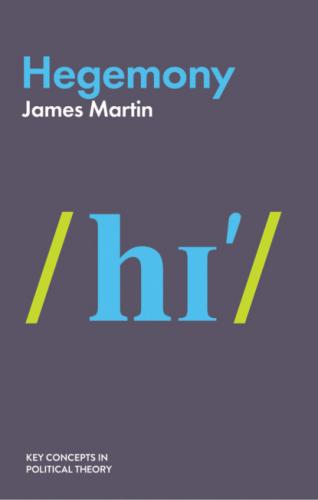‘Post-Marxist’ approaches to hegemony are the theme of chapter 4. The project of ‘radical democracy’ initiated by Ernesto Laclau and Chantal Mouffe involved a major theoretical reconstruction of hegemony as a framework of analysis and a strategy for emancipation. The obsolescence, as they saw it, of Marxist appeals to economic ‘determination’ and to the political primacy of class demanded new ways to theorize radical politics. Coming near the end of the Cold War and just in advance of the collapse of South African Apartheid, Post-Marxism and radical democracy looked forward, presciently, to a non-revolutionary, pluralist politics of social movements. In Post-Marxist approaches, hegemony became more theoretical but also more mobile, exploring diverse forms of power and domination, numerous different ‘discourses’, and political contests.
In chapter 5, we consider the application of hegemony to the study of international politics. Hegemony has a different lineage here. In theories of International Relations, it has been widely used by so-called ‘realist’ scholars to explain the leading role of a dominant world power in a system of states. That approach was challenged by radical critics – notably, Robert W. Cox – who drew on Gramsci’s insights to reconnect international politics to class struggles within world capitalism. Neo-Gramscian scholars of International Political Economy have subsequently explored the historical, political, and ideological dimensions of international hegemony. They have contributed to the analysis and critique of ‘globalization’, understood as an expansion of ‘neo-liberal’ capitalism.
Finally, chapter 6 turns its attention to critiques of hegemony by recent political theorists. Despite regular reinvention, hegemony is tied to a view of political power as something to be identified, challenged, and remade. For a number of critics, however, the language of hegemony – particularly its preoccupation with strategies that unify people and join them in a common project – remains a project of mastery. Indeed, it is argued – on the basis of radically different ‘ontological’ grounds – that hegemony cannot appreciate the dynamic nature of power and the ‘spontaneous’, ‘autonomous,’ and creative forms of resistance to it. A genuinely radical politics, it is proposed by various ‘new materialists’ and anarchists, demands not the reinvention but the end of hegemony.
Конец ознакомительного фрагмента.
Текст предоставлен ООО «ЛитРес».
Прочитайте эту книгу целиком, купив полную легальную версию на ЛитРес.
Безопасно оплатить книгу можно банковской картой Visa, MasterCard, Maestro, со счета мобильного телефона, с платежного терминала, в салоне МТС или Связной, через PayPal, WebMoney, Яндекс.Деньги, QIWI Кошелек, бонусными картами или другим удобным Вам способом.
